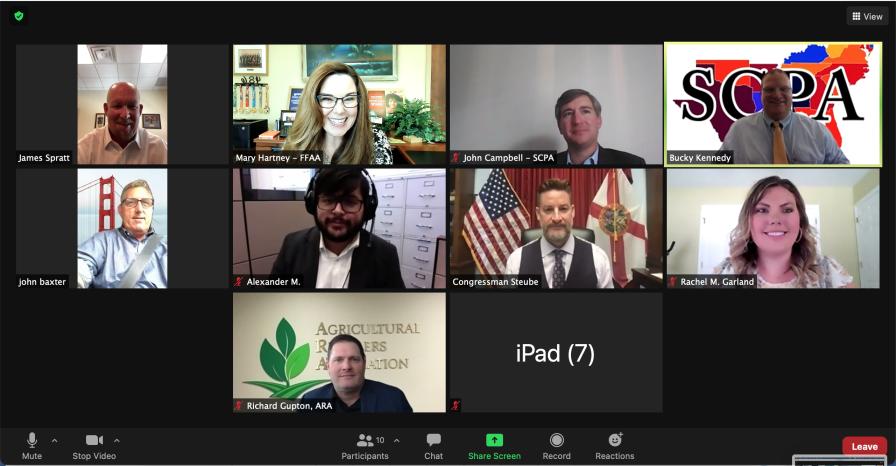Support Growing for Scientific, Risk-Based Regulation of Pesticides

Recent Southern Crop Production Association (SCPA) Virtual Hill visits proved fruitful for the Florida delegation as lawmakers and local industry stakeholders discussed current challenges regarding regulations.
With the hope that next time we’ll be in person, Florida Fertilizer & Agrichemical Association (FFAA) met virtually with Congressmen Neal Dunn, Greg Steube, and staffers of other Florida delegation members during the Southern Crop Production Association (SCPA) Virtual Hill visits.
SCPA and FFAA members covered three topics during the Florida meetings: Federal Insecticide, Fungicide and Rodenticide Act (FIFRA), Pesticide Registration Improvement Act (PRIA), and Mexico. The underlying theme was the agchem industry’s support for scientific risk-based regulation of pesticides.
Nutrien’s Rachel Garland was our go-to industry member when it came to talking about FIFRA — and if she wasn’t online, the topic was covered by SCPA’s Executive Vice President Bucky Kennedy or State Affairs Director John Campbell. Also chiming in at times were CropLife America’s (CLA) Beau Greenwood, Molly O’Connor, Ethan Mathews, and Riley Titus, and Richard Gupton with the Agricultural Retailers Association. The agchem industry sure is fortunate to have these folks advocating on our behalf!
These representatives described industry’s support for FIFRA. In recent years, there have been efforts to undermine the U.S. EPA’s risk-based approach to regulating pesticides. The sound science that has traditionally underpinned the EPA’s regulatory process has given way to politics and emotion. Legislative proposals that disregard EPA through the pesticide registration process are impacting CLA-member companies’ ability to bring new products to market and will result in decreased product availability for U.S. farmers. Industry may not always agree with EPA’s decisions, but the process works and deserves continued support.
The FIFRA Ask
Please oppose any legislative proposal that would undermine the EPA Office of Pesticide Program’s ability to effectively regulate pesticides.
PRIA: Helena Agri-Enterprises’ John Baxter covered the PRIA issue for our group. He explained industry supports PRIA and advocated for adequate funding for PRIA-related activities in FY 2022. Baxter noted that pesticide manufacturers support EPA’s work by paying fees that provide additional resources for EPA’s registration efforts.
In recent years, short-term PRIA extensions and funding shortfalls triggered a noticeable decrease in EPA staffing levels and a subsequent loss of institutional knowledge. Resulting delays in decisions have caused new products to address new and emerging pests and diseases to miss growing seasons and affects CLA-member companies’ decisions on new research and development investments.
The PRIA Ask
Please support statutory minimum funding of $128.3 million for EPA’s pesticide registration programs.
Mexico: With the assistance of CLA and SCPA’s policy handouts, I had an opportunity to chime in on the concerns regarding Mexico’s recent actions involving glyphosate. I especially appreciated when Beau Greenwood or Molly O’Connor with CropLife America covered this issue and asked for the member or their staff to reach out to the United States Trade Representative (USTR) and USDA to hold Mexico accountable under the United States-Mexico-Canada (USMCA) agreement.
In late 2019, the government of Mexico began to deny import permits of glyphosate with no scientific justification. Since this initial ban, the second largest export market for U.S. agriculture has continued to make radical shifts in its approach to pesticide regulation.
The Mexican government’s decree is not based on sound science and creates a dangerous precedent that could extend to other agricultural chemicals and to other countries in Central and South America. It is vital that our trading partners uphold their commitments in our trade agreements. The decree adopted by Mexico not only violates Mexico’s obligations under the USMCA, but also threatens to undermine international sanitary and phytosanitary trade provisions.
The Mexico Ask
Support a scientific, risk-based approach to regulation, and please contact USTR and USDA to raise concerns regarding Mexico’s trade obligations.
If you have a chance to meet with your congressional member and want to cover these topics, please contact me at [email protected] and I’ll share SCPA’s briefing packet.
Hope to see folks in D.C. next year with SCPA!









